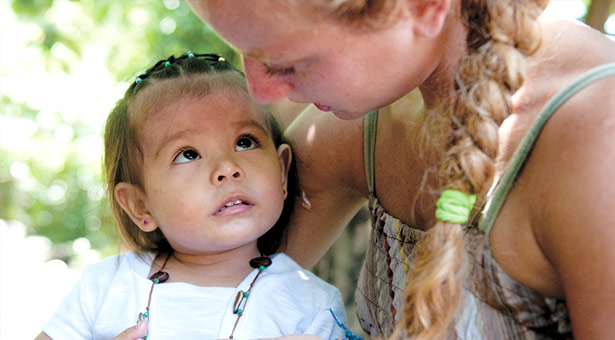The World Acting Globally
Alumna Uses Her Psychology Degree to Build Peace
At Home in Guatemala
By Allie Fraley (fraylea@spu.edu) | Photo by Kara Frisna

Anne Barkett advocates for disempowered groups in Guatemala.
Anne Barkett '09 first came to Guatemala by accident. After graduating from Seattle Pacific University with a degree in psychology, she planned to volunteer on an organic farm in Argentina.
When she was told that the farm could no longer host her, Barkett headed to an orphanage in Guatemala, where her aunt had a contact. “I immediately fell in love with the people,” she says.
The idea of sitting in a cubicle from 9 to 5 had never appealed to Barkett. “Ever since going to
Togo in eighth grade with my dad [a surgeon who volunteers each year in a Togolese hospital],
I've been drawn to international work,” she says. At Seattle Pacific, she volunteered and interned
with an array of nonprofits and schools, including the Seattle Bilingual Orientation Center and Agros International. She also participated in SPU SPRINT trips and the Refugee Project. She says, “The SPU community really fostered my love for international justice and development work.”
During Barkett's senior year, she took a cultural communications class and attended a lecture on the emerging field of international peace psychology, which applies the methods of psychology to the prevention of violence and destructive conflict. For her, this combination of interests pointed to moving abroad.
SPU faculty members Baine Craft and Mícheál Roe encouraged her to pursue her interest in Guatemala, which “is considered a post-conflict society following decades of brutal political
violence,” says Roe, dean of the School of Psychology, Family, and Community.
After her initial visit to the country, Barkett found a position with the Mennonite Central Committee working with the Kekchi youth in central Guatemala. Then she got a job with Semilla
Nueva, which means “new seed,” an organization that brings technology from the world's leading
agricultural research institutions to rural communities. Farmers try out new growing technologies
and share the techniques with neighboring farmers — a “farmer-to-farmer approach.”
“We are all about people-centered development,” Barkett says of Semilla Nueva. “We're not ‘gods' or ‘saints' coming to help the ‘poor'; we're facilitating their own process of helping themselves.” Right now, they're spreading the word about pigeon peas, a legume that enriches the soil through
nitrogen fixation, acting as a cost-saving natural fertilizer.
Barkett finds her degree in psychology beneficial as she interacts with Guatemalan families: “I feel
better prepared as an advocate for disempowered groups and have an understanding of the psychological dimensions of family systems, gender roles, and gender-typed behavior. In Guatemala, especially among the indigenous people, there's a very machismo culture.”
She sees changes taking place already as a result of Semilla Nueva's work. Communities and farmers, especially women, are being empowered. The soil is healthier. There are lower rates of malnutrition. Local leadership and community organization are flourishing.
“In peace psychology, we make distinctions between peacekeeping, peacemaking, and peacebuilding,” Roe says. “The work of Semilla Nueva is a fine example of peacebuilding.”
Currently, Barkett is creating a nutrition curriculum in the communities where Semilla Nueva has sustainable agriculture programs. She's also helping to form women's groups. “We get together and cook and have nutrition discussions,” she says.
Barkett doesn't envision leaving Guatemala anytime soon. “I resonate with the idea of living a simple lifestyle and being immersed in a community,” she explains. “I've found that here in Guatemala. It feels like home.”
